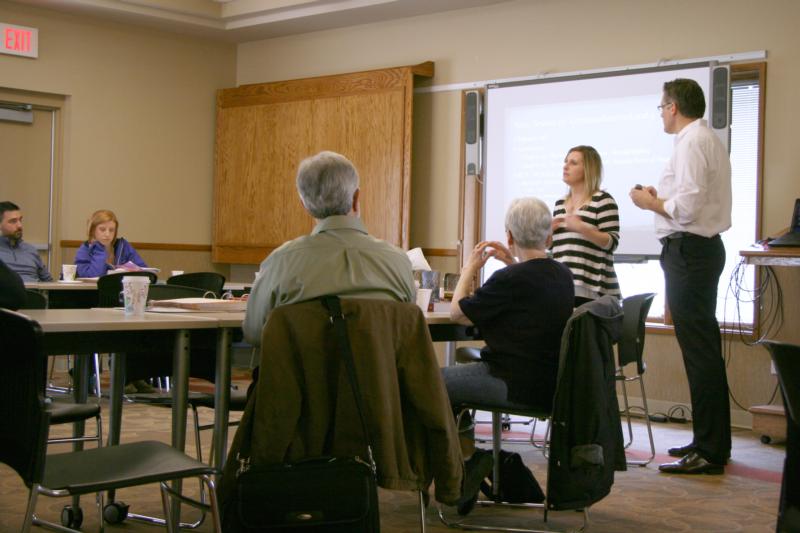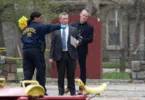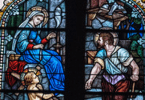
Julie and Scott Tylski discuss the Sixth Commandment Feb. 2 with their class in the Rite of Christian Initiation program at St. Stephen the Martyr Parish in Omaha, Neb. (CNS photo/Mike May, Catholic Voice)
by Mike May
OMAHA, Neb. (CNS) — Instructing the uninformed — one of the spiritual works of mercy — might sound challenging, or even intimidating.
But for Scott and Julie Tylski, it has simply been answering the Holy Spirit’s call to share their faith.
Since 2014, the Tylskis have helped others prepare to enter the Catholic Church at Easter as leaders of the Rite of Christian Initiation of Adults classes at St. Stephen the Martyr Parish in Omaha.
“It’s part of our vocation as the baptized to share the faith, but it’s also something that has helped us develop in our own faith,” Scott told the Catholic Voice, newspaper of the Archdiocese of Omaha.
The Tylskis conduct classes every Sunday, this year for 14 candidates and catechumens, from September through the end of Lent. Classes include a discussion of the day’s Mass readings, helping participants understand the context of the readings and how to internalize and apply them to their daily lives, Scott said.
They also cover one topic from the Catechism of the Catholic Church each class, Scott said.
“By the time the course is over, we will have been through the entire catechism,” he said. “We try to make the conversation a blend of learning … here’s what the church teaches, and we also try to make it interactive, so the folks have the opportunity to apply it to their lives, to respond, to ask questions.
“Here’s a group of people hungry to be part of the Catholic Church, and we simply are helping them understand what that means,” Scott said. “It’s through the Holy Spirit that they’re touched, and we are a vehicle, an instrument — but it’s really the Holy Spirit working in their hearts.”
Julie agreed: It’s the work of the Holy Spirit.
“I pray every Sunday before class that the Holy Spirit will guide our words and open their hearts to whatever he has to say,” she said. “I pray ‘please let your words, not my words, be what come out in class.'”
Father James Tiegs, St. Stephen the Martyr pastor, said the parish’s RCIA program tries to create within an RCIA group a taste of what the Catholic Church is, by “experiencing the church through their interactions with each other.”
A key part of that is how the Tylskis communicate their deep faith and love for God, Father Tiegs said. As they exercise their work of mercy, “they’re not just teaching, they’re witnessing,” he said.
“We’re simply instruments of God’s mercy,” Scott said, describing their mission to teach as a spiritual work of mercy. “This calling to help instruct in RCIA is just one of those ways to simply share our faith.”
Julie said she had been thinking for several years about RCIA classes. “We’ve taught baptism preparation classes for about 15 years, but RCIA had been on my heart, and the Holy Spirit kept bringing it to me,” she said.
At first concerned about the time commitment — preparing for and teaching two-hour classes that meet weekly for about six months — Scott eventually felt the call to RCIA and they began teaching.
“We feel like it’s a talent we have to interact with people and present to people, so we’re using our God-given talents to share something that we prize so deeply,” he said. “Although I had often given presentations for my job, I also found out that I love to teach, and I didn’t know that before.”
Father Michael Gutgsell, who has seen RCIA in action for years, including as pastor of St. Cecilia Parish in Omaha and previously as chancellor of the archdiocese, agrees that RCIA instructors often personally benefit from the experience, receiving a share of God’s mercy.
“It is both a giving and a receiving that takes place in the process,” he said. “In that sense, instructing the uninformed is sharing in the forming and informing. If you know something and you’re able to help another, you’re being formed in the very thing that you’re helping somebody else to become informed in.”
He said teaching RCIA classes also is an act of mercy because it is “sharing a gift and a treasure and experiencing the further value of that treasure by being able to hand it on to those who are receiving it for the first time.
“It isn’t just getting something, but having received something, they now have a privilege to hand that on again,” Father Gutgsell said.






